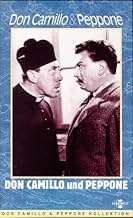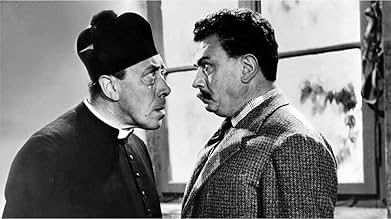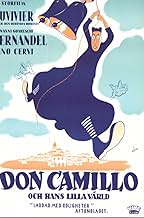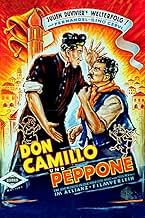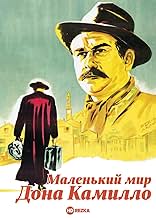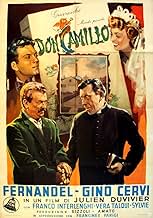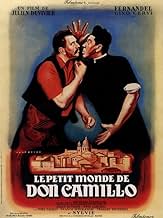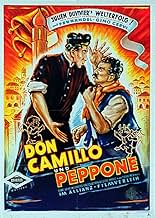Don Camillo
- 1952
- 1h 47min
CALIFICACIÓN DE IMDb
7.6/10
5.1 k
TU CALIFICACIÓN
Agrega una trama en tu idiomaA determined priest and a Communist mayor develop a grudging friendship in spite of their official rivalry.A determined priest and a Communist mayor develop a grudging friendship in spite of their official rivalry.A determined priest and a Communist mayor develop a grudging friendship in spite of their official rivalry.
- Dirección
- Guionistas
- Elenco
- Nominada a1 premio BAFTA
- 3 premios ganados y 3 nominaciones en total
Vera Talchi
- Gina Filotti
- (as Vera Talqui)
Charles Vissières
- Il Vescovo
- (as Charles Vissiere)
Clara Auteri Pepe
- Woman saying 'Viva Peppone!'
- (as Clara Auteri)
Manuel Gary
- Il delegato
- (as Manoel Gary)
Opiniones destacadas
I think this is a very funny movie, Despite the fact it is a white&black film and you really can tell that it is placed on a certain time frame (end of 1940's - early 1950's), the plot is fun and universal. It gives you a glimpse of the life on a small Italian town, where simple things turns into hilarious situations, thanks to the strange relationship of friendship/rivalry between Don Camillo and Mayor Peppone. I was lucky to see the original french version (subtitled, of course) which is always better than hearing a translated version. I think that original voices -even if you do not understand the language- reveal the character's feelings, and give credibility to actor's performances. After the film, you get the impression that life is somewhat easier to cope with...
Fernandel is Don Camillio, the reactionary village priest. Gino Cervi is Giuseppe 'Peppone' Bottazzi, the communist mayor and the fierce opponent of of Camillio. In their own little world, they engage in a fierce and time-honored struggle for the hearts, minds, souls and well-being of their community. Cervi has his organization and supporters. Camillio only only the voice of G*d to narrate the events and to reproach him when he fails in his work; however, since it's Orson Welles' voice, the honors are more than even in this loving little film by Julien Duvivier.
It's an odd film from Duvivier, whose movies often celebrated the unseen hand of fate, leading men to destruction. Yet in this movie, everyone knows who they are and what is important, even if they disagree fiercely. So the old teacher rails against stupidity and hopes for a pension; the young lovers re-enact Romeo and Juliet; and the communist brings his newborn child to be baptized as Giuseppi Stalin.
Perhaps it is the inherent humility of these people that makes Duvivier adore them. They do not fight their fates, but recognizing it, do their best within it. Duvivier made a sequel, and Fernandel repeated the role four times, his lugubrious face making him the perfect parish priest.
It's an odd film from Duvivier, whose movies often celebrated the unseen hand of fate, leading men to destruction. Yet in this movie, everyone knows who they are and what is important, even if they disagree fiercely. So the old teacher rails against stupidity and hopes for a pension; the young lovers re-enact Romeo and Juliet; and the communist brings his newborn child to be baptized as Giuseppi Stalin.
Perhaps it is the inherent humility of these people that makes Duvivier adore them. They do not fight their fates, but recognizing it, do their best within it. Duvivier made a sequel, and Fernandel repeated the role four times, his lugubrious face making him the perfect parish priest.
In 1948 the Italian journalist and novelist Giovannino Guareschi wrote: Mondo piccolo : Don Camillo (translated in French en 1951 in Le petit monde de Don Camillo).Giovannino Guareschi creates in this book two strong characters: Don Camillo, the priest of Brescella and Giuseppe "Peppone" Bottazzi ,the communist mayor of Brescella.In 1952 French and Italian producers ask the French director Julien Duvivier to direct the "The little world of Don Camillo" with Fernandel and Gino Cervi as main actors.
Julien Duvivier is a French director well know by "Sous le ciel de Paris", "Marie-Octobre" and "The Devil and the Ten commandments".
Fernandel and Gino Cervi don't need any presentation, there were well known actors in their respective countries.
"Don Camillo" is then the story of the rivalry between Don Camillo and Peppone.The two men have fought together in the Italian resistance and now one is the priest of the village and the other one is mayor of the village.We are in the time of the cold war: in Italy there are now two important political parties who dominate the political life in the country and also in this village of the Po Valley.Don Camillo criticizes Peppone and Peppone criticizes Don Camillo.Every one is thinking in the next moves that he can do to annoy the other one,but also, they will help each other in the difficult moments of their lives.I forget to mention an important character of this film ,the narrator who tells quietly and with humour the rivalry betweeen Don Camillo and Peppone.
French comic actor Fernandel embodied the title role while remarkable Italian character actor Gino Cervi played his spiritual and political opponent. More than a rustic comedy, the film epitomizes the postwar political polarization in Italy and symbolizes the famous "compromesso storico"---historical compromise---under which Italy would long continue to be governed. This successful film spawned a series of popular sequels, mostly with the same two actors, all based on the Giovanni Guareschi novels. A point of clarification: this was a French-Italian co-production and was first released in the U.S. in its French-language version with English subtitles before the dubbed English version with narrator Orson Welles went into circulation. The Italian-language version, not readily available, is the most appropriate one.
(Since I originally submitted this review to the IMDb, an English-subtitled DVD of "The Little World of Don Camillo" -- and of its first sequel, "The Return of Don Camillo" -- has become available in the US. However, I still think that a fan might be interested looking at in the old dubbed version, if he or she can find it.)
This film is the first in a series of five shot in the 1950s and 60s based on Giovanni Guareschi's well-loved "Don Camillo" stories. The joint Italian-French productions were made with the involvement of the author himself, who wrote screenplays and Italian dialog for various entries in the series; therefore, most consider them to be the official movie versions of the Don Camillo stories. Guareschi is quoted as warmly approving of the way that stars Fernandel and Gino Cervi brought to life his two famous protagonists, the battling parish priest and Communist mayor of a small village in post-war Italy. Today, more than forty years after the series was completed, the films are still played on European television, dubbed into a variety of languages. Unfortunately, however, they are all but unknown to English-speaking fans (particularly American ones) of Giovanni Guareschi and his wonderful characters.
But this need not be, for "Le Petit Monde de Don Camillo" (1951) does exist in an English-dubbed version. The only one of the five films to get the treatment, it is quite well done (once you get around the fact that it's dubbed in the first place). "King of Dubbers" Robert Rietti (Rietty) takes on the roles of both Don Camillo and Peppone, while none other than Orson Welles provides the voice-over narration and, in that capacity, the voice of Christ which Don Camillo hears in answer to his prayers. The narration is intrusive at times (they got their money's worth out of Welles), but the movie overall is a faithful adaptation and interweaving of some of the more memorable early Don Camillo tales.
As the story opens, we meet hot-tempered Don Camillo complaining to the Lord about the recent election of the town's Communist contingent. The new Mayor, Peppone, is a particular thorn in Camillo's side, as the two have had an on-going rivalry which only escalates after the election. Conflicts abound: Peppone wants to have his son baptized "Lenin," but Don Camillo has other ideas. The priest has been trying for years to scrape together the money for a town recreation center, then suddenly the Communists tap an unorthodox source of funds and build their own "People's Palace." Peppone wants to fly the Red banner at a church procession, and he doesn't take Don Camillo's veto well. Don Camillo invests heart and soul into a soccer match between the church's team and the Party's, and he doesn't understand why the Lord declines to take a side. The Communists call a strike against the local landowners, but Don Camillo is determined to save the neglected farm animals. And somehow, amid all the sometimes humorous, sometimes serious conflict, a Catholic "Juliet" and a Communist "Romeo" have fallen in love. Can priest and mayor lay down their fists and help them?
I should add, for the *very* knowledgeable Don Camillo film fan, that the dubbed version of "Little World" is based on the Italian rather than the French cut of the original movie (director Julien Duvivier and the mostly bilingual cast shot the two versions simultaneously). Thus, certain scenes that appeared in the French release but were excised by the censors in stricter Italy will not be in the English version.
I believe the dubbed version of "The Little World of Don Camillo" is still available in vintage video catalogs (that's where I got my VHS edition in 1998), and it's worth looking for, especially for fans of the warm and whimsical tales on which it is based.
This film is the first in a series of five shot in the 1950s and 60s based on Giovanni Guareschi's well-loved "Don Camillo" stories. The joint Italian-French productions were made with the involvement of the author himself, who wrote screenplays and Italian dialog for various entries in the series; therefore, most consider them to be the official movie versions of the Don Camillo stories. Guareschi is quoted as warmly approving of the way that stars Fernandel and Gino Cervi brought to life his two famous protagonists, the battling parish priest and Communist mayor of a small village in post-war Italy. Today, more than forty years after the series was completed, the films are still played on European television, dubbed into a variety of languages. Unfortunately, however, they are all but unknown to English-speaking fans (particularly American ones) of Giovanni Guareschi and his wonderful characters.
But this need not be, for "Le Petit Monde de Don Camillo" (1951) does exist in an English-dubbed version. The only one of the five films to get the treatment, it is quite well done (once you get around the fact that it's dubbed in the first place). "King of Dubbers" Robert Rietti (Rietty) takes on the roles of both Don Camillo and Peppone, while none other than Orson Welles provides the voice-over narration and, in that capacity, the voice of Christ which Don Camillo hears in answer to his prayers. The narration is intrusive at times (they got their money's worth out of Welles), but the movie overall is a faithful adaptation and interweaving of some of the more memorable early Don Camillo tales.
As the story opens, we meet hot-tempered Don Camillo complaining to the Lord about the recent election of the town's Communist contingent. The new Mayor, Peppone, is a particular thorn in Camillo's side, as the two have had an on-going rivalry which only escalates after the election. Conflicts abound: Peppone wants to have his son baptized "Lenin," but Don Camillo has other ideas. The priest has been trying for years to scrape together the money for a town recreation center, then suddenly the Communists tap an unorthodox source of funds and build their own "People's Palace." Peppone wants to fly the Red banner at a church procession, and he doesn't take Don Camillo's veto well. Don Camillo invests heart and soul into a soccer match between the church's team and the Party's, and he doesn't understand why the Lord declines to take a side. The Communists call a strike against the local landowners, but Don Camillo is determined to save the neglected farm animals. And somehow, amid all the sometimes humorous, sometimes serious conflict, a Catholic "Juliet" and a Communist "Romeo" have fallen in love. Can priest and mayor lay down their fists and help them?
I should add, for the *very* knowledgeable Don Camillo film fan, that the dubbed version of "Little World" is based on the Italian rather than the French cut of the original movie (director Julien Duvivier and the mostly bilingual cast shot the two versions simultaneously). Thus, certain scenes that appeared in the French release but were excised by the censors in stricter Italy will not be in the English version.
I believe the dubbed version of "The Little World of Don Camillo" is still available in vintage video catalogs (that's where I got my VHS edition in 1998), and it's worth looking for, especially for fans of the warm and whimsical tales on which it is based.
¿Sabías que…?
- TriviaThe whole film was shot twice; there is a French and an Italien negative, that can be distinguished by details in editing and content (watch the position of the dog during the procession for example).
- Citas
Crocefisso: Where did you get that cigar, Camillo?
Don Camillo: Peppone had two. I think I took it without asking him. You know he believes in equal distribution of wealth.
- Versiones alternativasGerman version runs 2 minutes shorter than the Italian original version.
- ConexionesFeatured in Cinema forever - Capolavori salvati (2001)
Selecciones populares
Inicia sesión para calificar y agrega a la lista de videos para obtener recomendaciones personalizadas
- How long is The Little World of Don Camillo?Con tecnología de Alexa
Detalles
- Fecha de lanzamiento
- Países de origen
- Idiomas
- También se conoce como
- The Little World of Don Camillo
- Locaciones de filmación
- Productoras
- Ver más créditos de la compañía en IMDbPro
- Tiempo de ejecución
- 1h 47min(107 min)
- Color
- Relación de aspecto
- 1.37 : 1
Contribuir a esta página
Sugiere una edición o agrega el contenido que falta

